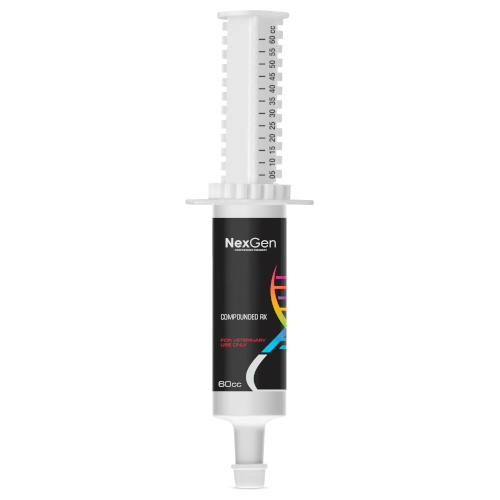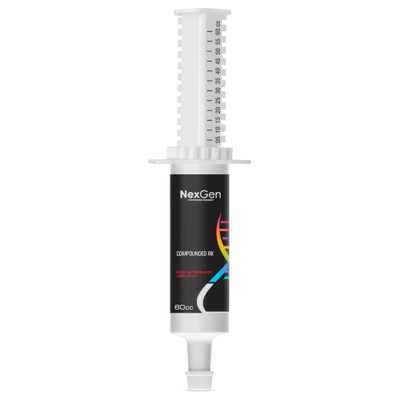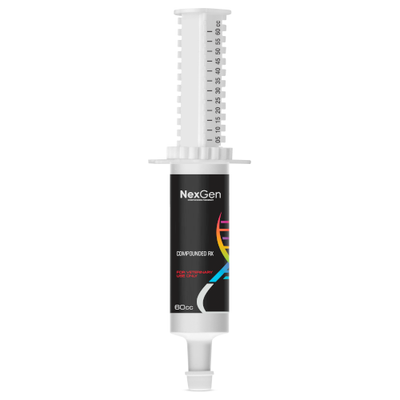
Enrofloxacin 250 mg/mL, Oral Paste, 60mL Syringe
Login for pricing
- Brand
- Mixlab
- SKU:
- NC-0491
- Product Type:
- Paste
- Size:
- 60ml
- Administration:
- Oral
Horses are regularly exposed to bacterial pathogens that have the potential to infect their blood, lungs, intestines, reproductive systems, urinary tract, mammary glands, skin, muscles or joints. The immunization of horses with vaccines to prevent or reduce the severity of infectious diseases is a very important component to infection control, however, it is important for horse owners and managers to realize that vaccination is only one part of a complete infection control plan.1,2 Very few vaccines protect with 100% efficacy, and there are diseases of the horse for which there are no licensed vaccines.
Some of the more common bacterial diseases that can affect horses include:
Strangles is a highly contagious disease of the equine upper respiratory tract caused by the bacterium Streptococcus equi. This disease is contracted via environmental contamination, nasal discharge, or direct contact with infected animals.
Potomac Horse Fever is caused by the parasite Neorickettsia risticii and is characterized by fever, laminitis, edema, severe diarrhea and occasionally, death. Horses are infected by insects that carry the parasite. It is not contagious and occurs more commonly in wet areas.
Tetanus is caused by the bacteria Clostridium tetani. These bacteria usually enter the horse’s body through wounds from the environment or, occasionally from surgical procedures. Affected horses can suffer from spasms, high fever, violent reactions to sudden movement or noise and even death from asphyxiation. Tetanus is almost always fatal.
Endotoxemia, as the name suggests, is caused by the presence of endotoxins in a horse’s blood resulting from certain types of bacteria in the gut that have breached the gut wall and entered the bloodstream. If not treated promptly, endotoxemia can lead to shock, laminitis, and death.2 Endotoxemia is seen both in adult horses and in newborn foals.
Intestinal bacterial infections. There are many types of intestinal bacterial infections that can infect horses. The most common infectious cause of diarrhea in horses is salmonella, which is the result of an infection of the horse’s intestinal tract by a bacterial pathogen of the same name.2
Endometritis is inflammation of the endometrium (uterine lining) that can occur shortly after breeding,4 or after giving birth as a result of placental retention or contamination of the reproductive tract during delivery.5 Some mares may be are classified as susceptible or resistant to persistent breeding-induced endometritis (PBIE) based on their ability to clear such infections spontaneously by 48 h post-breeding. The most common cause of endometritis in mares is by the bacteria Streptococcus zooepidemicus, although other bacteria (e.g., Escherichia coli, Pseudomonas aeruginosa, and Klebsiella pneumonia) can also cause endometritis.4
Where to buy Enrofloxacin
Enrofloxacin is available in the U.S. through several pharmaceutical manufacturers and through veterinary custom compounding companies.
Enrofloxacin carries numerous potential drug interactions. Please consult your veterinarian prior to beginning any treatment regimen.
FOR RX ONLY: A valid prescription from a licensed veterinarian is required for dispensing this medication.
1aaep.org.
2Panchaud, Y., et. al. Bacterial infections in horses: a retrospective study at the University Equine Clinic of Bern. Schweiz Arch Tierheilkd. 2010 Apr;152(4):176-82. doi: 10.1024/0036-7281/a000040. PMID: 20361396.
3Davis, J. What's New in Antibiotics, Antifungals, and Antivirals for Horses. Proceedings: NAVC Conference 2013 Large Animal.
5Canisso IF, Segabinazzi LGTM, Fedorka CE. Persistent Breeding-Induced Endometritis in Mares - a Multifaceted Challenge: From Clinical Aspects to Immunopathogenesis and Pathobiology. Int J Mol Sci. 2020 Feb 20;21(4):1432.









